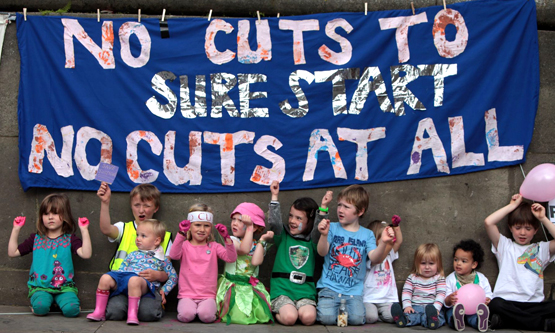
Childcare in Britain is simply unaffordable for working class people. Universal free childcare should be a basic right. Parents should be free to work, study and relax. It is important for children to be brought up in a stimulating, high quality, socialised setting. However, the British state’s contempt for working class people means access to decent, affordable childcare is increasingly impossible. This is yet another aspect of austerity which hits working class women hardest. In recognition of the childcare crisis the government has introduced a few high profile schemes meant to improve childcare. In reality, these schemes are token responses and cannot make up for rising costs, benefit cuts, stagnating wages, and an increasingly insecure job market. Rachel Francis reports.
Inadequate provision
78% of families with children rely on childcare, with 59% paying for it, in addition to the informal care provided by family members, particularly grandparents (Department for Education, 2014). On average, parents spend a third of their income on childcare, with many spending up to half. Since 2010, the cost of part-time provision for a child under two has risen by a third. The average cost of a part-time place is over £100 per week for most of England, and much higher in London.
Working parents of three- and four-year-olds are technically entitled to 15 hours of free childcare a week. In June the government announced that this will be doubled to 30 hours. From 2016, the pilot scheme will offer increased care for three- and four-year-olds, providing either their single parent, or both parents, are working an as yet unspecified number of hours. However, government grants are not sufficient to cover even the current provision of 15 hours. As Neil Leitch, chief executive of the Pre-School Learning Alliance explains, ‘the so-called “free” childcare scheme is nothing of the sort. For years now, the initiative has been subsidised by providers and parents because of a lack of adequate government funding.’ Many providers require parents to book a minimum number of hours which exceeds the free provision, with additional hours charged at increased rates. Early Years providers warn that care quality will worsen and inequality will increase. The scheme also drives an ideological division between ‘working families’ – those lucky enough to meet the minimum number of working hours – and parents on insecure work contracts, studying, or unemployed, who do not qualify for free childcare.
Childcare resources are stretched to the limit. Despite the 2006 Childcare Act requiring local authorities to provide childcare for working parents, only 43% actually do, down from 54% last year. Real spending per child on childcare, Sure Start services and early education has fallen by a quarter between 2009-10 and 2012-13. Childcare places were cut by 40,000 under the Coalition government. Campaigning groups report 600-800 Sure Start centre closures.
Inequality perpetuated
The only government childcare spending to increase since 2010 was on employment childcare vouchers, given to families who earn more than the tax credit cut-off point. Working tax credit childcare elements, however, which support families on lower wages, are being cut and withdrawn at lower wage bands. Working class families are forced to spend a much greater proportion of income on childcare. This remains acute in London, in combination with exorbitant rents, but increasingly families across the country are making up a shortfall of over £52.50 per week. When childcare costs are included in household spending, 133,000 more children are classed as living in poverty. Increasing the childcare support covered by Universal Credit from 70% of costs to 85%, due to be implemented in April 2016, may offer some relief. However, in the wider economic context, parents will remain paying more and more for childcare.
Children suffer
Following revelations of rising child poverty in Britain, in September 2014 the number of two-year-olds from the poorest families entitled to part-time free, early education was increased to 40%. Local uptake has been varied, ranging from 35% to 100% across the country. A Freedom of Information request found that many local authorities did not have available places. For nine out of ten children in the scheme, care takes place in private, voluntary and independent settings. An independent report found that care was concentrated in poorer quality centres; less than 50% were placed where a qualified Early Years Professional worked directly with the children. Children’s centres no longer have to offer places to children living in the most disadvantaged areas. Whilst private centres have benefited, inequality in access to care has grown. Just 21% of local authorities in England had sufficient appropriate childcare for disabled children, a reduction from an already meagre 28% in 2014.
Staff are underpaid and undervalued – in detriment to children’s play and learning environment. Funding for training has been cut, and Early Years Teachers are no longer required to study for a Post Graduate Certificate of Education, despite an independent review’s recommendations.
The contradictory pressures on women put them in an impossible position. Childcare costs are forcing women back into the home, but the punitive benefit system seeks to force them back to work. ‘The reality is that for too many families it simply does not pay to work,’ concluded the Family and Childcare Trust (2015). Parents who stay at home face hounding by the jobcentre, with the threat of benefit sanctions. Government cuts, closures and price hikes to community centres, swimming pools, libraries and children’s centres, mean that vital places parents can take children and meet with other families are disappearing. Things look set to worsen for parents-to-be; working class families with a baby will lose the most financial support overall under the new welfare measures. Parents and communities organising themselves to fight for childcare is the only solution to this impossible problem.
Statistics drawn from:
Childcare costs survey: 2015, Family and Childcare Trust, The Coalition’s Record on the Under Fives: Policy Spending and Outcomes 2010-2015 – Social Policy in a Cold Climate.
FRFI 247 October/November 2015




